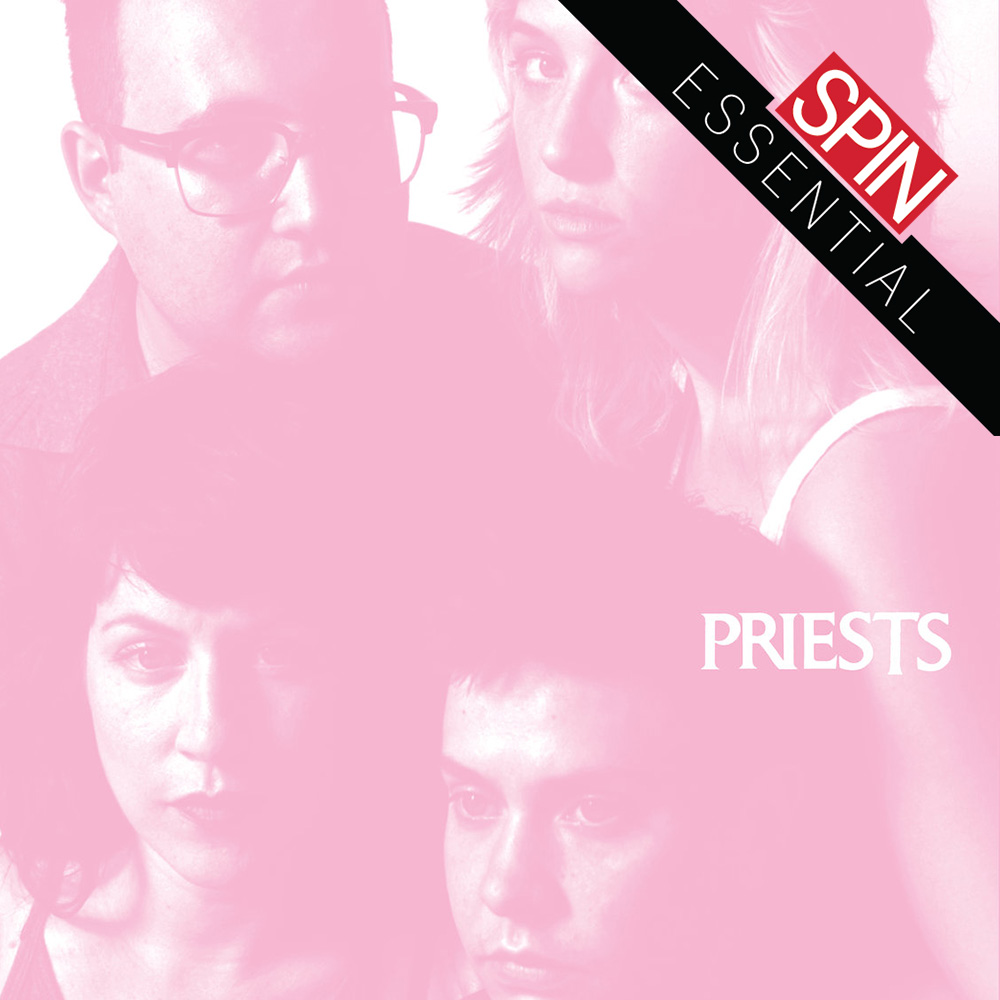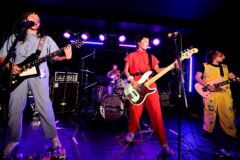Anyone who’s said “at least a Trump presidency will make punk rock great again” hasn’t been paying attention to Priests, the D.C. band who’ve been releasing ferocious, funny music attacking late capitalism and its discontents since 2011. They’re best known for their lapel-gripping mix of claustrophobia and confrontation; brought to life, any given Priests song paces around the cage and shakes the bars.
This gripping quality is communicated most visibly by singer Katie Alice Greer, who yelps, shrieks, and chants her way through choruses designed as self-aware tantrums, demanding someone answer for this mess they’ve put us in. But Priests is very much a collective project, driven equally by Daniele Daniele’s urgent drumming, Taylor Mulitz’s post-punk bass lines, and G.L. Jaguar’s sinister guitar tones. On Nothing Feels Natural, their long-awaited debut full-length, each band member pushes themselves to new levels—something Daniele characterizes in a 36-page (!) interview zine accompanying the record as “the reach,” the “exposed vulnerability” that surfaces when someone struggles to carry out something new and just barely makes it.
The reach is all over Natural, which displays influences from the Raincoats and Shopping to krautrock and Portishead. For Daniele, this meant exploring more dynamic drumming styles; for Jaguar it meant turning down the distortion and focusing on single notes instead of chords. Songs like “Appropriate,” “Pink White House,” and “Puff” cover familiar territory, shouting down Burger King, Wheel of Fortune, and an American dream replete with palm trees and SUVs. “Pink White House” is peak Priests—clever and dystopian, slick with B-movie horror lines like “you are just a cog in the machine / and I am a wet dream / soft and mean.”
But where previous Priests songs rarely made it past the three-minute-mark, an extended bridge gives it a sense of space. Similarly, the second half of “Appropriate” descends into deconstructed no-wave chaos, with Luke Stewart pulling pure agony out of improvised saxophone. The jazzy flourish reappears on an ambient mid-album interlude, and the tail-end of kitchen-sink disco groove album closer “Suck.” (We saw it coming with Downtown Boys and Bueno and Pill but could it be that, in Alan Vega’s wake, sax is back in punk?)
Maybe the most surprising moments are on near-pop ballads like “Nicki” and the title track, where Greer sings in a lower, more melodic register somewhere between Stevie Nicks and Jessicka Addams. “Nicki” is about building walls around yourself, opening with “I don’t make friends easily or naturally / you can blame chemicals or you can blame patriarchy,” and Greer’s vulnerable delivery is a way to directly address that tendency. As with “Nicki,” most of the tracks on Natural are not so much missives as they are vignettes. Priests has already put in work spelling out the conditions of late capitalism; here they are painting impressions of how it feels to live within it, the toll it takes on your spirit and your relationships.
One standout example is “No Big Bang,” a tightly wound spoken word track which closes out the first half. Written by Daniele, the song captures the careening arc of mania and smashes the desire to fetishize mental illness, dryly tracing “those moments when your mind becomes a rocket” to “the sheer stupidity of the roller coaster,” and “the slab of concrete below.” Daniele’s voice accelerates over the steady anxious heartbeat of the rhythm section and shivers of guitar noise, the song running along the same “narrow track of logic” as the narrator’s mind, occasionally folding over itself to up the claustrophobia.
In the zine, Daniele also characterizes “the reach” as a moment of authenticity. But in a genre where “authenticity” is supposedly located in stripped-down effortless amateurism, Priests is at their most authentic when they’re using performance to challenge themselves and their audience. “I have no idea what that means,” Greer said in the zine about the idea of just being yourself. “I am constantly perceived. Nothing feels natural, I don’t have a natural state, I am always performing.”
It’s a feeling familiar to anyone who’s ever worked a service job, serving food or drink but also a legible, tippable persona. In fact, the title track was written by Greer while working an unsatisfying restaurant job that left her depressed and frustrated. It’s a searching, melancholy track that’s a plea for freedom, rather an attack on the powers that be. When Greer sings “No it’s not for anyone / and I can’t wait until it’s done” you understand she means not only her shift, but the material conditions that make that shift necessary. The service industry and the music industry are what they are, but despite the disempowering conditions created by their existence, Priests have created a space to feel powerful.





